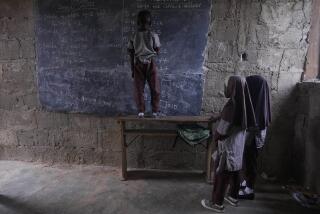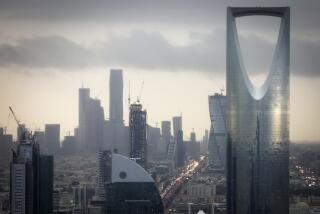Nigeria Works Overtime on New Capital
- Share via
ABUJA, Nigeria — A layer of Saharan sand carried by the Harmattan wind covers the construction site at Abuja, where workers toil day and night to build Nigeria’s new “unity” capital.
After several false starts over the last decade, Nigeria’s military government is determined to move the administrative hub of Africa’s most populous nation from Lagos to Abuja. Officials hope the move will be completed in time for a planned return to civilian rule in October, 1992.
Officials say it will be a full-time capital and that President Ibrahim Babangida will probably take up residence in what is known as “unity city” any time now.
It is clear, however, that much needs to be done before Abuja--in a neutral area between Nigeria’s Muslim-dominated north and mainly Christian south--becomes fully operational.
There is limited air service to Abuja, and the 500-mile drive from Lagos, on often narrow and potholed roads, is not recommended for the fainthearted.
Large tracts of the planned city outskirts, land tilled for centuries by tribal people, are still populated by long-horned Fulani cattle.
Some of Abuja’s 100,000 inhabitants complain of exorbitant housing and food prices being charged by get-rich-quick merchants.
Foreign diplomats, realizing that the government means business, are scrambling to rent properties before building embassies on land being allocated by the government.
Giant cranes with arc lamps dominate the first stage of development--a presidential complex, wide highways with little traffic, two major hotels, government ministries, apartment buildings and a huge, gold-domed mosque.
The ambitious plan for Abuja, which has already cost about $5 billion, was originally conceived in 1976, but construction was hampered in the 1980s by falling oil revenues.
Under the plan, 3.1 million residents are expected by 2000. This contrasts with the 7 million or more who inhabit Lagos, a city known for overcrowding and extensive urban decay.
“I don’t think the 2000 target is realistic, but we can start government from the first phase, now substantially completed,” said Abdulkhadir Kure, Abuja’s director of engineering.
Work on the presidential complex and the supreme court is expected to be completed this year. The third arm of central administration, the national assembly, will be built nearby.
Kure said the public sector had constructed 20,000 residential units for the city, whose current population is dominated by civil servants, and that 40,000 are planned by 2000.
Officials say Abuja may not be able to cope with its rapidly increasing population because of slow action in the private sector, which is scheduled to build more than 60,000 residential units by the turn of the century.
“There is a big housing problem. Some civil servants have had to double up in apartments for at least four years,” said an official for the 797-room, Hilton-run hotel.
Residents say the annual rent for a small three-bedroom home in Abuja is $6,500, compared to $4,000 in Lagos. Charges are considerably higher for foreigners.
“A weekend shopping spree for a family of four costs about 450 naira ($45) here, compared to 60 to 70 naira ($6 or $7) in Lagos,” said Felix Onuah, chief Abuja correspondent for the Daily Reporter newspaper.
Leaders of the many thousands of tribes people in the Federal Capital Territory have welcomed the building of Abuja.
They foresee modern homes and better schools, health and recreational facilities for their people.
“We are very happy about the development. We want to achieve the goal of (national) unity, but there are bound to be effects on cultures,” said Alhaji A.A. Mamman, a traditional ruler, during an interview in his residence near a mud-brick village.
But some local people doubt whether the benefits, including running water and electricity, will outweigh the disadvantages.
“Now we are a village, but other people, such as workers, will come and live here. This could increase robberies and other crimes,” said Joyce Maiyaki, a 20-year-old policewoman.
More to Read
Sign up for Essential California
The most important California stories and recommendations in your inbox every morning.
You may occasionally receive promotional content from the Los Angeles Times.













